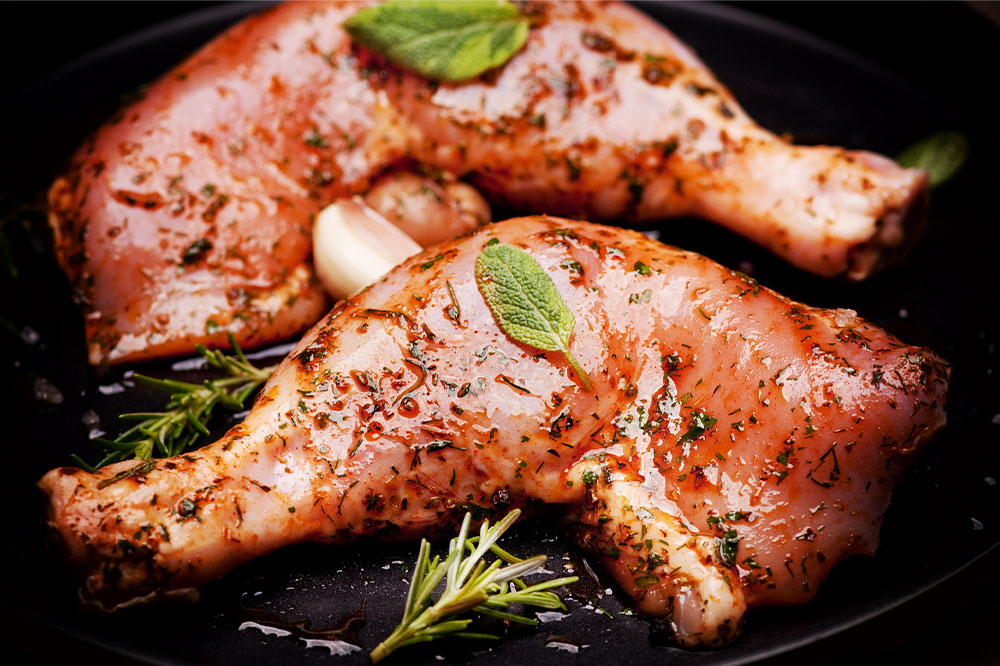15 Human Foods That Are Safe and Healthy for Dogs

Pet parents leave no stone unturned to ensure their pet’s good health. Purchasing premium pet foods, pet-proofing the home, and taking their pets for vet visits are just some of the measures pet parents take to keep their pets healthy. Nutrition is one of the most essential aspects determining a dog’s general well-being. In addition to specific dog foods available on the market, certain human foods can also provide dogs with the required nourishment:
Chicken
Most dogs will surely enjoy a simple yet satisfying meal of boiled chicken and rice. Boiled chicken can serve as an excellent low-fat meal for dogs, providing them with their daily dose of protein and helping with muscle and bone health. However, eating chicken in its raw form is not advisable, as it can increase the risk of salmonella and other bacterial infections. It is also best to avoid adding spices and salt to the chicken meal, as these can result in digestive issues like diarrhea and vomiting. Plain boiled chicken, preferably with some boiled rice, is the best bet for a sumptuous meal for one’s pooch.
Eggs
Eggs are rich sources of protein, fatty acids, and vitamins A, B2, and B12, making them a healthy breakfast option for dogs. Free-range eggs are healthier than regular ones, as they have fewer saturated fats and cholesterol and more omega-3 fatty acids and vitamin A. Moreover, it is advisable to avoid feeding raw eggs to dogs and opt for boiled eggs without salt and spices.
Fatty fish
Fatty fish like salmon, tuna, mackerel, and herring are packed with omega-3 fatty acids, which are essential for a dog’s skin and coat. Fatty fish are particularly healthy for dogs with dry skin or who live in cold and dry climates. Boiled fish without salt and spices is the best way to serve fish to dogs.
Turkey
Several pet owners are often confused about whether turkey is healthy for their pets. Cooked turkey is a wholesome meal for dogs. However, Thanksgiving turkey, which includes generous quantities of butter, oil, herbs, salt, and spices, is unhealthy and should not be served to dogs. Moreover, turkey skin harms dogs’ stomachs and pancreas; thus, dogs should only have de-skinned turkeys. De-skinned, boiled turkey without the bones, salt, and spices makes for a healthy dog meal.
Carrots
Carrots are loaded with beta-carotene and are excellent low-fat snack items for dogs. Diced, peeled carrots are better than whole carrots, as the latter may cause choking. Moreover, limiting dogs’ carrot intake to one a day is advisable.
Unsalted popcorn
Dogs need not feel left out during their favorite humans’ movie-watching sessions. Plain, unsalted popcorn is a rich source of phosphorus, zinc, and magnesium and can be enjoyed in limited quantities by dogs. However, in addition to not being salted, the popcorn served to dogs should not contain any spices or butter.
Bananas
Bananas are packed with vitamins, fiber, potassium, and magnesium and are great energy sources for dogs. But they also contain high levels of sugar; hence, it is best to limit dogs’ intake of peeled bananas to once or twice a week.
Cucumbers
Cucumbers are rich in essential nutrients like magnesium, copper, vitamins, and phosphorus. Peeled and diced cucumbers can be served as crunchy snacks alongside diced carrots or in isolation.
Cashews
Limited quantities of cashews are safe human foods for dogs and can provide them with essential nutrients like magnesium, copper, and calcium. Dogs can be served up to five cashews at a time.
Sweet potatoes
Sweet potatoes contain less fat and are rich in vitamins A, B6, and C. Boiled sweet potatoes are also good sources of fiber and can act as complete meals for dogs, but they should be served without any spices or salt.
Apples
Apples can provide dogs with vitamins A and C and fiber; moreover, they contain fewer quantities of fat and protein and are, therefore, highly suitable for older dogs. Therefore, de-seeded, peeled apples can make appetizing snacks for dogs.
Cantaloupes
Cantaloupes contain a wide range of nutrients, including vitamin C, beta-carotene, folate, and potassium, besides being fiber-rich fruits with high water content. Thus, peeled and diced cantaloupes are healthy snack options for dogs, but they are also high in sugar content and should be served in moderation.
Peaches
Small quantities of fresh or frozen peaches are rich in vitamin A and fiber and may be enjoyed by dogs. However, the peach pit contains cyanide, which is poisonous to dogs; thus, the pit should be discarded while serving them this fruit.
Pumpkins
Pumpkins promote good digestion and skin and coat health. They also help remedy digestion issues like constipation and diarrhea. Moreover, this vegetable contains vitamins A, C, B1, and B6, copper, folate, fiber, and magnesium, among other nutrients. Dogs should be fed boiled pumpkin that is not salted or spiced.
Watermelons
About 92% of a watermelon’s constituents are water, which ensures optimal hydration during hot summer days, even for dogs. Moreover, this fruit contains essential vitamins such as vitamins A, B6, and C, and potassium. However, pet owners should ensure their dogs do not consume watermelon rind and seeds.
Pet care and nutrition are vital to a dog’s health and longevity. However, life is unpredictable, despite several measures taken to prevent untoward incidents. Hence, purchasing a dog insurance policy is essential for dog owners to obtain financial compensation in the event of injuries or accidents to their dogs.
Today, many dog insurance policies cover various services, from diagnostics and screenings to treatment options and rehabilitation. The premium amount for such policies is typically based on the cost of veterinary interventions in a particular area. The premium also differs based on the pet’s gender, age, breed, and species. Thus, a healthy and active lifestyle can prevent health conditions, whereas a best-value pet insurance plan for dogs ensures financial recovery in such situations.